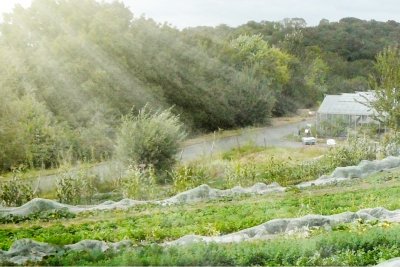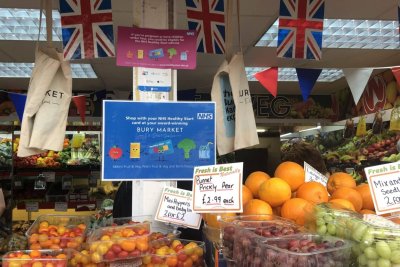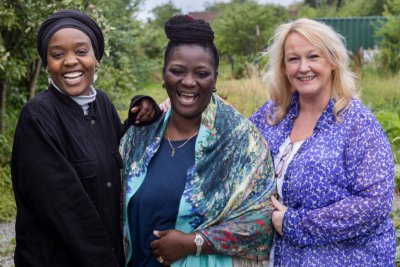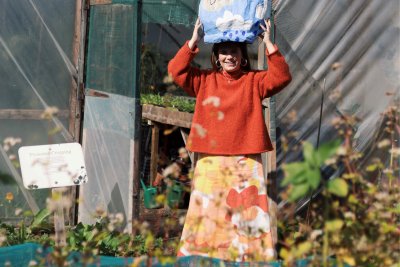Blogs • Sustainable Farming Campaign
COPing out: what can we take away from COP27’s Adaptation and Agriculture Day?
The climate summit, COP27, held a day dedicated to Adaptation & Agriculture for the first time, but it was dominated by agribusiness and food corporations, with a conspicuous absence of farming voices. What did we learn from agriculture day and has it led to any promising outcomes?
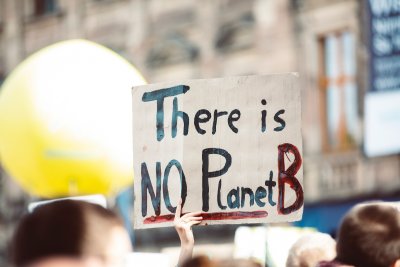
This was an historic milestone. For the first time, after 26 climate COPs, food and farming was on the agenda of this summit in a more ‘meaningful’ way. It was supposed to signal a more thorough process for the mitigation and adaptation of the climate crisis when it comes to the food system and land use.
However, it became clear that the agenda for talks and negotiations were missing an important voice – farmers and growers. In particular, smaller and medium-sized farmers who are pioneering regenerative and agroecological approaches to food production, were clearly left out of the conversation.
Instead, large agribusiness and food corporations seemed to be given free rein to set the direction, and so they did. This has raised serious worries that COP27 will embed industrial agriculture further and hamper the international need to cut greenhouse gas (GHG) emissions and sequester and store atmospheric carbon.
This is concerning, as historically, and even today, industrial agriculture significantly contributes to GHG emissions and is the leading cause of nature loss globally, while stripping people and communities of land and justice, let alone the farmers who receive a raw deal from this consolidated and corporate food system.
Here are some quick stats: 30% of global GHG emissions come from the food system (70% of that is associated with agriculture and land use change); only 3% of climate finance has gone towards food; 90% of global farming subsidy (eq. $540 billion per year) goes towards practices harmful to climate.
At the Food System Pavilion, large agribusiness and corporate food giants including Bayer and Nestle set an agenda for pumping more money into making industrial farming slightly more efficient and used the agriculture day as an opportunity to greenwash. The Food4Climate pavilion, on the other hand, has been discussing the role of holistic thinking and agroecological farming as ways to transform the food system for the benefit of both people and planet.
Key outcomes (and what did we learn?)
- Agriculture Innovation Mission (AIM) for Climate fund doubled: an $8 billion fund made up from 275 Government and non-Government partners aiming to invest in so-called ‘climate smart’ agriculture and food system innovation.
- Initiative on Climate Action and Nutrition (I-CAN) launched: a) connect actions to tackle climate and nutrition; b) outline deliverable and monitor progress; c) facilitate provision of high-level support for UN member states; d) provide examples of what member states can do to take integrated action; e) outline I-CAN’s role in advancing integrated outcomes.
- Food and Agriculture for Sustainable Transformation (FAST) launched: a new initiative targeted at improving food security in those countries most vulnerable to the climate emergency. There are three key objectives: a) increase access to finance; b) provide knowledge and capacity; and c) give policy and dialogue support.
We learnt that COP conveners and Governments are continuing to deprioritise the need to reduce emissions from the food system (including agriculture) by not tackling root causes including unequal access to land and resources; the intensive use of synthetic inputs (fertiliser and pesticide); the removal of biodiversity infavour of monocultural farming; and the inefficiency of using so much of the planet’s land and resources for livestock farming (especially animal feeds and monocultural grassland) and junk foods to feed western diets and for biofuels. Furthermore, it’s clear that the voice of farmers and the recognition of system change are being pushed out of the conversation.
However, to have a day dedicated to agriculture is progress in itself – but it needed to be done better and with more ambition.
It is difficult to see real progress being made from this around the integrated issues of climate, nature, health, and justice when it comes to the food and farming system. It is hard to see past the AIM for Climate fund being an exercise in greenwashing and embedding the industrial agriculture model further. And while I-CAN tries to bring together climate and health, the very high-level nature of it will raise questions about how effective it will be at creating change in that integrated way.
While it is good to see the FAST initiative focus on food security and climate vulnerable countries, it is uncertain how effective it will be, and whether it will safeguard the millions of small farmers at serious risk of climate crisis impacts.
What was missing and what more needs to be done?
The AIM for Climate fund has two main criticisms:
- It is heavily influenced by Big Ag which is reflected in its vision and priorities of technology and tweaks around the edges, rather than systemic change.
- The size of the fund will not stretch very far and is going to the wrong places. IPES-Food have said it is Governments offering significant funding to industrial farming and large agribusiness.
The international community must review their approach to agriculture financial support so that it is in line with a transition to climate and nature-friendly farming (i.e. agroecology), and delivers for small and medium-sized farms.
A Climate Agreement for Food and Farming has been launched at COP27. This is a voluntary agreement to reduce GHG emissions from the food system by 30% by 2030. While voluntary commitments do not legally commit countries to take action, we hope to see the UK sign this.
The UK Government needs to have an ambitious GHG emissions reduction target for agriculture and the food system, with a clear plan to reach it set out in the Net Zero Strategy, including:
- Taking a different approach to finance and climate. Instead of AIM’s approach, the £3.6 billion spent each year to subsidise UK farming, including the Environmental Land Management (ELM) schemes, should support farmers in transitioning to agroecological farming systems including reducing intensive livestock, and reducing reliance on inputs (fertiliser, pesticide, animal feeds). Due to ELM and the ‘public money for public goods’ approach, the UK Government can set itself as a leading country in demonstrating how this change can happen in the global North.
- Supporting fairer dealing and more localised food systems, and new measures to ensure the market supports farmers delivering on climate, nature, health, and justice issues in an integrated way. This could set targets and policy framework and bring the wider UK into alignment.
- Introducing a moratorium on new factory farms (especially poultry, pig, and dairy). This would be a quick win that reduces direct emissions from these farms, helps tackle our water pollution crisis and reduce the risk of zoonotic diseases, doesn’t lead to an increase in livestock numbers, as well as reducing our overall footprint associated with production of animal feeds, fertiliser, and transport.
- Revising the UK’s Nationally Determined Contribution (NDC) to integrate a transition to climate and nature-friendly farming which is more effective at delivering GHG emissions reductions, sequestering and storing carbon, and ensuring better nutritional food security.
Sustain’s new Every Mouthful Counts report looked at how well local councils are including food in their climate plans and concluded that national leadership is needed. Welsh and Scottish targets on food waste and food growing led to much better policies at a local level in these nations. Find out more by exploring the interactive map.
COP28 organisers must ensure that talks on food and farming are inclusive of farmer communities, and citizens concerned about food systems, and not exclusive, as at COP27.
Published Wednesday 16 November 2022
Sustainable Farming Campaign: Sustain encourages integration of sustainable food and farming into local, regional and national government policies.
